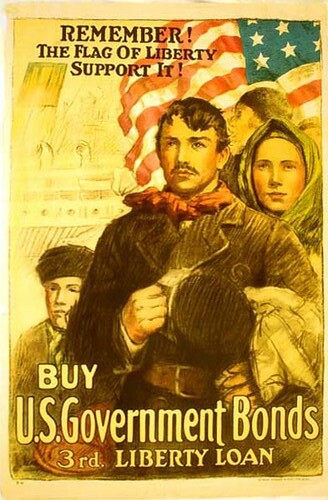
http://www.flickr.com/photos/mfspeccoll/4899716535/in/set-72157624742434...
The poster obviously plays off of the war in a method of guilting its viewers into buying government bonds. Its caption: "Remember! / The Flag of Liberty / Support It! / Buy U.S. Government Bonds" implies with its sense of false urgency that NOT rushing out at once to buy bonds is an act of direct defiance towards the government, all one's American ancestors (Remember), and the current soldiers dying in the war. The depiction of the American citizen on the poster is interesting; the poster plays to traditional masculinity in placing the broad-shouldered, traditionally strong-figured male front and center in the image. However, the characters behind him appear to represent the "weaker" members of society: women, children, and perhaps the elderly. Also, these background characters are dressed in a different garb than the male, potentially to strike a resemblance to the immigrant clothing of ancestors in a play for further sympathy/guilt. The American flag behind them emphasizes their patriotism through having supported the war efforts, again implying treason through neglect of this duty. There also appears to be a faint outline of a large ship on the left side, drawing a connection with the positive notion of progress and development.
Other than loose connections of the gender/cutural environments of the war, I find it difficult to specifically connect this poster back to Brittain's work. However, I will say that a particular passage from the reading this week reminded me of our in-class discussion. We briefly wondered in class why Brittain's writing had only surfaced on the verge of tensions which began WWII, and perhaps the answer to this question lies in James' finding that "In wartime, images overwhelm words" (24). During the war or even immediately afterwards, I think Brittain's words would have fallen on deaf ears. People were so fed up with the war and the images streaming from it that they had no desire to delve into a long non-fiction work about what it felt like to be involved. They wanted to escape, as (probably) did Vera Brittain herself.
